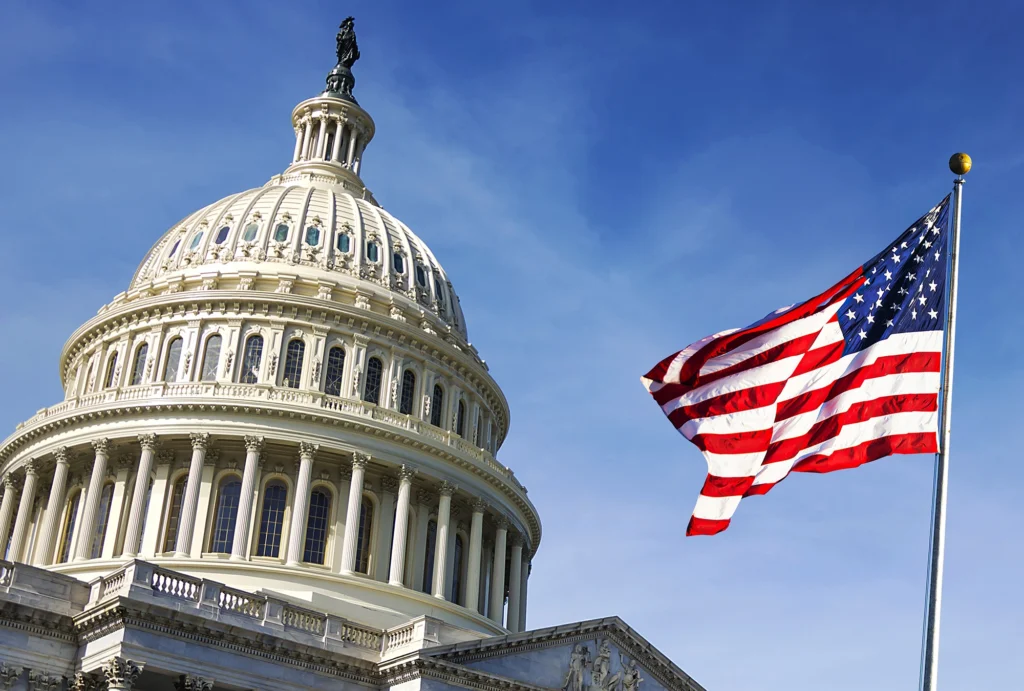The One Big Beautiful Bill Act (OBBBA) was signed into law by President Trump on July 4, 2025.1 The bill continues most of the tax provisions originally passed in the Tax Cuts and Jobs Act (TCJA) in 2017 and adds several new deductions, credits, and planning opportunities.
The overview below focuses on the main items in the bill that I believe could impact personal taxes. New tax laws equate to new opportunities to craft strategies to help clients save money. This is an opportune time to connect with your wealth advisor to discuss how these new laws impact your tax and overall wealth planning strategy.
We’ll be publishing more detailed articles on each provision. This is a high-level summary of the items agreed upon by the House and Senate.
The following is in order of the law and focuses primarily on the personal tax provisions.
Key personal tax provisions
- Tax rates and brackets: Extended “permanently.” (The word permanently means there are no scheduled sunsets or automatic changes until Congress decides otherwise.)
- Standard deduction: The higher standard deduction brought to life in TCJA is now permanent and slightly increased from $15,000 for single filers and $30,000 for married filing jointly (MFJ) to $15,750 and $31,500, respectively. No changes were made to the additional standard deduction for those 65-and-older or blind, which remains at $2,000 for single filers and $1,600 for MFJ.
- Personal exemption: Permanently removed.
- Senior deduction: A new $6,000 deduction per taxpayer aged 65 or older applies for tax years 2025-2028.
- Child tax credit: Increased from $2,000 to $2,200 per eligible child in 2025. The refundable portion of $1,400 is also now permanent. Both amounts will be adjusted for inflation annually.
Business and investment related provisions
- Qualified Business Income (QBI) deduction: The 20% deduction is permanently extended. While there was discussion of increasing it to 23%, that proposal did not pass. The phase-out range was slightly increased to $150,000 for joint filers and $75,000 for others, with a minimum deduction of $400 for businesses with at least $1,000 in income.
- Estate and gift tax lifetime exemption: Increased by about 7% to $15 million per person for 2026. This exemption is made permanent and will be adjusted for inflation.
- Alternative Minimum Tax (AMT): Exemptions and inflation adjustments are made permanent, but the phase-out threshold is reset to $1 million (down from ~$1.25 million) and will inflate from that level going forward.
- Mortgage interest itemized deduction: Permanent extended. The TCJA had reduced the cap from $1 million to $750,000 of home acquisition indebtedness, with no deduction for home equity loans. That structure remains in place.
- Opportunity Zones: This program is made permanent and introduces several key changes, including a rolling 10-year designation cycle, stricter eligibility criteria for census tracts, and enhanced reporting requirements for Qualified Opportunity Funds (QOFs) and Qualified Opportunity Zone Businesses (QOZBs).
Ready to learn more about our family office for your family?
Additional tax changes
- Casualty loss deduction: Permanently eliminated except for federally declared disasters and, newly added, certain state-declared disasters.
- Miscellaneous itemized deductions: Permanently eliminated. However, unreimbursed educator expenses will become deductible beginning in 2026.
- Pease limitation: This limitation on total itemized deductions for high income taxpayers is permanently eliminated. However, a new limitation reduces itemized deductions for those in the 37% tax bracket to a 35% benefit.
- Moving expense deduction: Permanently eliminated except for members of the armed services and, newly added, the intelligence community.
- Wagering losses: Beginning in 2026, only 90% of wagering losses are deductible, and total losses cannot exceed gambling income.
- ABLE-to-Work and 529-to-ABLE rollovers: Made permanent, allowing disabled individuals who work to contribute to an ABLE account and also rollover a 529 savings account to an ABLE account. In addition, those contributing to an ABLE account can take a Retirement Savings Contribution Credit on their deposits, permitted they meet the income limitations. Their credit amount is also increased to $2,100 beginning in 2027.
- Student loans: Discharged loans due to death or disability, remain permanently tax-free.
- State and Local Tax (SALT) deduction cap: Permanently extended at $10,000 ($5,000 if married filing separately), with a temporary increase to $40,000 for 2025-2029. However, it phases out for taxpayers with an adjusted gross income (AGI) over $500,000. Find out more details here: The SALT Cap: What’s Changed & Why It Matters
- Tips and overtime deduction: New deductions of up to $25,000 (tips) and $25,000 (overtime) apply from 2025–2028. These deductions phase out for incomes over $150,000 (single) or $300,000 (MFJ). These amounts are still subject to payroll taxes and must be reported on W-2s.
- Auto loan interest deduction: Another new provision is the deduction for auto loan interest of up to $10,000 per year from 2025–2028 for U.S.-made passenger vehicles under 14,000 pounds (no campers or RVs). Leases and commercial vehicles do not qualify. The deduction phases out by 20% for each dollar of AGI over $100,000 (single) or $200,000 (MFJ).
- Trump Accounts: Newly created “Trump Accounts” become effective in 2026. However, every child born in 2025–2028 will have an account prefunded by the government with $1,000. Accounts are structured like IRAs with non-deductible contribution limits of $5,000 per year (funded by the child, parents, and even employers). Contributions end when the beneficiary reaches age 18. Investments must generally be mutual funds or exchange-traded funds that track a U.S. stock index with annual fees under 0.1%. Growth is tax deferred, and withdrawals cannot begin until the child is 18. Withdrawals in excess of basis are taxed as ordinary income and, if not a qualified distribution, subject to 10% penalties. Withdrawals are allowed for education, first-time home purchases, and small business expenses.
- Immediate business expense: Allows immediate business expensing of machinery, equipment, R&D, and new domestic factories.
- Clean energy tax credits and incentives:
- Section 179: Increased deduction for faster depreciation in small businesses.
- Adoption tax credit: Up to $5,000 of the credit is now refundable. Previously the entire amount was nonrefundable. This will help taxpayers with lower income tax liabilities recover more costs associated with adoption.
- Dependent care spending accounts: Contribution limit increased to $7,500 (not indexed for inflation).
- Child and dependent care credit: Increased from 35% to 50% of eligible expenses, with improved phase-down rules starting in 2026.
- Employer student loan repayment: The ability for employers to pay down employee student loans on a tax-free basis up to $5,250 per year is made permanent. In 2027, the $5,250 will be indexed for inflation.
- 529 qualified expenses: The definition of qualified expenses for 529 distributions is enhanced to include non-tuition related expenses for attending public, private, or religious elementary and secondary schools. In addition, the annual distribution limit of $10,000 is doubled for K-12 expenses. Student loan payments as qualified expenses are made permanent. Lastly, a newly added section permits expenses required for attaining and maintaining professional credentials as qualified.
- Charitable deductions: Reinstatement of charitable deductions allowed for non-itemizers worth $1,000 (single) and $2,000 (MFJ) beginning in 2026.
- Cash contributions: The cap at 60% of AGI for charitable cash contributions is made permanent.
- Charitable contributions: Implemented a new 0.5% of AGI floor, marginally reducing the benefit of charitable contributions.
- Qualified Small Business Stock (QSBS): Code Section 1202 QSBS receives several changes including a tiered gain exclusion: 3-year holding allows a 50% gain exclusion, 4-year holding allows a 75% gain exclusion, and 5-year holding allows a 100% gain exclusion. The exclusion cap increased from $10 million to $15 million and is inflation-adjusted beginning in 2027.
- Health Savings Accounts (HSAs): Most of the proposed changes to HSAs in the House bill were scrapped. However, Bronze and catastrophic health plans under the Affordable Care Act will now qualify as High Deductible Health Plans (HDHPs) for purposes of HSA eligibility.
- Green initiatives: Eliminated green initiatives such as electric vehicle credits, energy efficient home improvements, and clean energy production.
| For more information on the OBBBA, visit our library of articles. |
Preparing for changes: How Mercer Advisors Can Help
While the above list is long, and probably a bit dry, it’s still not a complete overview of all the changes made by the OBBBA. This summary focuses on the provisions most likely to that impact your personal taxes and financial plan.
Now is the perfect time to consult with your wealth advisor and tax professionals familiar with your overall financial situation. They can help you prepare for these changes with a well-defined tax strategy.
At Mercer Advisors, we offer an integrated wealth management solution that includes tax planning and preparation, financial planning, estate planning, insurance solutions, investment management, and more. These recent tax law changes underscore just how interconnected your financial life is — and why having a coordinated team that understands the full picture can make all the difference. Whether it’s optimizing your tax strategy, adjusting your investment plan, or revisiting your estate documents, we’re here to help you navigate these changes with confidence and clarity.
If you’re not a Mercer Advisors client and want to know more about our tax optimization strategies and how we can help you navigate tax laws, prepare for changes, and optimize tax strategies, let’s talk.
1 “R.1 – One Big Beautiful Bill Act.” Congress.gov, July 4, 2025.
Mercer Advisors Inc. is a parent company of Mercer Global Advisors Inc. and is not involved with investment services. Mercer Global Advisors Inc. (“Mercer Advisors”) is registered as an investment advisor with the SEC. The firm only transacts business in states where it is properly registered or is excluded or exempted from registration requirements.
All expressions of opinion reflect the judgment of the author as of the date of publication and are subject to change. Some of the research and ratings shown in this presentation come from third parties that are not affiliated with Mercer Advisors. The information is believed to be accurate but is not guaranteed or warranted by Mercer Advisors. Content, research, tools and stock or option symbols are for educational and illustrative purposes only and do not imply a recommendation or solicitation to buy or sell a particular security or to engage in any particular investment strategy. For financial planning advice specific to your circumstances, talk to a qualified professional at Mercer Advisors.
Mercer Advisors is not a law firm and does not provide legal advice to clients. All estate planning document preparation and other legal advice is provided through select third parties unaffiliated to Mercer Advisors.
Tax preparation and tax filing are a separate fee from our investment management and planning services.
Mercer Global Advisors has a related insurance agency. Mercer Advisors Insurance Services, LLC (MAIS) is a wholly owned subsidiary of Mercer Advisors Inc. MAIS provides individual life, disability, long term care coverage, and property and casualty coverage through various insurance companies. For Mercer Global Advisors clients who wish to purchase insurance products, MAIS has entered into a non-exclusive referral agreement with Strategic Partner(s), where the Strategic Partner will provide necessary services relative to the marketing, placement, and servicing of the insurance products, including without limitation preparing and presenting illustrations, supporting the underwriting process, assisting with the completion and execution of applications, delivering policies, and servicing in-force business. MAIS and the Strategic Partner will be listed as either “agents” or “co-agents” on the policies. While Mercer Global Advisors does not receive a referral fee, Strategic Partner receives a percentage of the commission revenue. MAIS and Strategic Partner do have a revenue sharing agreement.
Certified Financial Planner Board of Standards, Inc. (CFP Board) owns the CFP® certification mark, the CERTIFIED FINANCIAL PLANNER™ certification mark, and the CFP® certification mark (with plaque design) logo in the United States, which it authorizes use of by individuals who successfully complete CFP Board’s initial and ongoing certification requirements.
CFA® and Chartered Financial Analyst® are registered trademarks owned by CFA Institute.





